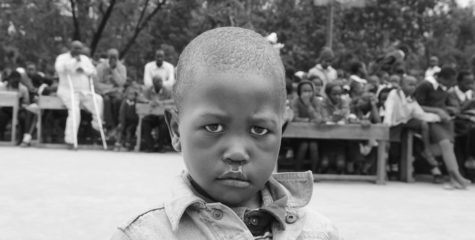White walls to dirt floors: stories from world’s most impoverished

Stepping into the one-room, dirt-floor shack that “Mama Theresa” took great pride in, I was ravished with guilt when I looked around and thought of what this home was like before its additions of a wooden table, refurbished roof and new mattress.
Based on descriptions relayed to me, I imagined the dirt floor carpeted with fleas visible a foot high which was encased by rickety boards eaten through by maggots. On the ground was a cot that Kenyan student Theresa Beatrice Maina, 17, and her mother shared, permanently moldy and bug-infested due to the rainfall that poured through the roof made of plastic bags. Theresa’s younger brother still sleeps with the cows in the manure beside the trees, from which two of her brothers and father hung themselves because of the despair-turned-alcoholism that plagued their lives, that stand in stark remembrance.
I found stories like Theresa’s to be the norm this summer when my family and I traveled to Kenya with the non-governmental organization Matanya’s Hope, which connects sponsors with African children who need funding for school, among other enterprises. We visited many schools and orphanages in Kenya to distribute thousands of donations, serve porridge to children and check-in on sponsored students.
We stayed in the homes of sponsored families, which were livable, but far from what I’m used to. Coming from the white walls of Northbrook, an 86.1 percent Caucasian community according to the Northbrook census, adjusting to being the minority took time as children on the street pointed and shouted “muzugo!” or “white person!” at me.
On our first day, we went to Kibera, the largest urban slum in Africa, whose existence the Kenyan government denies. Even with peppermint-scented handkerchiefs pressed over our noses, the foul stench of human feces was pungent and unmistakable in the streets, which were lined with trash fires and beat-up storefronts that held everything from flip phones to unrefrigerated, fly-covered raw meat.
Upon arriving at the school we were donating to, we were welcomed by children singing songs and sharing spoken word poems. One song told the darkness of Kibera when a girl of maybe 10 years old warned other girls to be cautious.
“Men have lost their control,” said she. “Fathers have turned against daughters, even animals are unsafe.”
After our welcome, we were given a tour of the school. Narrow outdoor alleys were noisy and cramped with classrooms on either side, and the odor of urine from the waste-filled, doorless stalls added to the stifling effect. However, the claustrophobia I experienced pales in comparison to that of the children packed like sardines in their classrooms, with up to 100 students in a room the size of an average Northbrook bedroom.
After passing out donations, we played with the children, who looked at us like we were aliens. Babies bawled at the sight of us, seeing white skin for the first time. I was swarmed by little fingers grasping and stroking my hair as well as voices remarking how smooth and light it was, having never felt hair that wasn’t knappy like theirs.
Bombarded with questions from the curious voices like if I eat “Omena fish” I was initially confused. I was later told that it’s an old myth that Omena fish have eyes like the sea and turn your eyes blue if you eat them. It was also a culture shock to be asked what tribe I was in, coming from the ethnically homogenous area of Northbrook.
How strange it is that the problems we face every day aren’t even on their radar. In our community, people obsess over how they look, while in Kenya I had to point out to a child who she was in a photo because she had never seen her own face. Here, college, ACT scores and GPAs cause obscene amounts of stress. There, many students go to school just for the provided meal.
Though the pain these people struggle through is justification for any demeanor, the generosity shown to me was breathtaking. It was mind-boggling to be offered food and drink time and time again from families who make 25 cents a day, families who lack even enough to feed themselves.
Through sponsorship, women like Theresa are able to get private education and build a better life. I was lucky enough to spend a day with Theresa and could barely hold myself together as she poured over photographs of our Northbrook lives, as if the simple things we had were the fantasies she entertained in her dreams.
How, I wondered, could she love me, who has everything but never earned it, when she has been given such hardship but has done everything to deserve the opposite?

